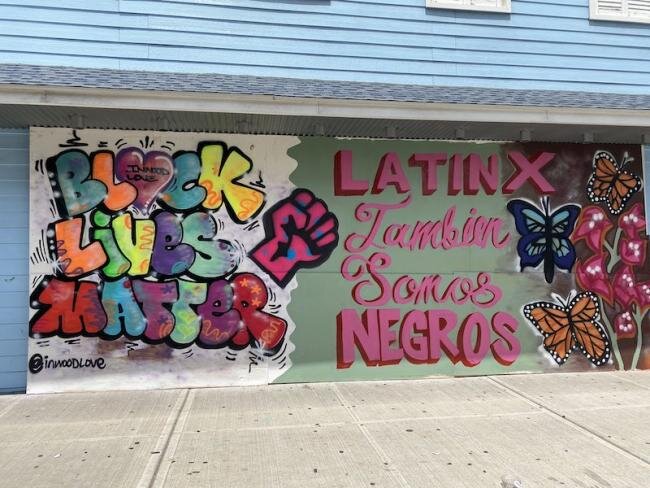
Ways of Learning.
Mural in Inwood. Photo by Pedro A. Regalado.
Black. Migration. Houston. aims to educate about the intersections of race, gender, sexuality, and citizenship that inform the experiences of Black LGBTQ+ immigrants.
A key component of our project is the development of resources for the education of students, scholars, community members and Black LGBTQIA+ migrants in the US South.

Ola Osaze, Director of Black LGBTQ+ Migrant (BLMP), addresses attendees of the BLMP gathering who are working to build community and develop organizational strategies.

Group image of BLMP NYC Core Team at the NY Retreat where leaders established the local network and community priorities. Organized by BLMP NYC.

Alan Pelaez (founding member of BLMP; member of BLMP Bay Area) notes responses during the BLMP Steering Committee Retreat.

BLMP workshop attendees organize to establish a local network in the South.
One of our goals is to tell new and different stories about who Black LGBTQIA+ migrants are in this space. Dominant narratives imply that Black and gender-queer migrants are criminals and least deserving of support. We correct these narratives by placing migration, gender, sexuality and anti-blackness in context.
We know that life, liberty, safety and justice are not as easily accessible for Black LGBTQ+ immigrants today. Through this work we will show some of the difficult choices faced by Black LGBTQ+ migrants to the US. Understanding systemic violence is essential in working for justice for marginalized communities.
We have created our learning component with our diverse community in mind. We seek to reach Black LGBTQ+ migrants, those preparing to work with this diverse group, and people seeking to learn more.
Components of Structural Oppression.
Our learning modules fall into three categories: anti-blackness, migration, and sexuality. All of the modules reflect the intersection of all three components while also emphasizing one component in order to communicate the learning objective.
Anti-blackness.
Anti-blackness refers to structures, behaviors, and attitudes which strip black people of their humanity. Specifically, it refers to political disenfranchisement, impoverishment through land seizures and theft, exclusion from employment and education, restriction from healthcare, virulent surveillance, and state-sanctioned violence and killing.
Migration.
Migration refers to the movement of people across space. Specifically, we consider the movement of black, gender-queer persons, through the Americas, and into the U.S. South. We seek to understand the political, social, and economic factors which effect the decision to migrate and the experience of migration.
Sexualities.
Sexuality refers to the expression or repression of sexual feelings. Though it is often described in terms of heterosexuality or homosexuality, it includes a spectrum of expressions which may or may not align with a person’s gender assignment. We consider sexualities in relation to migration, race, and policies which exclude gender queer people.
Future Plans for Our Learning Modules
Black. Migration. Houston. is an on-going initiative and our learning topics and resources are under development. We will expand them based on community contributions and our efforts in resource development. What would you like to see here?
Upcoming learning topics, resources and lesson plans will teach visitors to the website about some of the challenges Black LGBTQ+ people face as they migrate. These challenges include navigating different institutions such as detention centers, courtrooms and the legal system more broadly, homeless shelters in the region, airports, hospitals, religious organizations, and health care systems. If you have information about these organizations and institutions or you represent one serving migrations, please be in touch with what you think would be valuable to share on this site.




